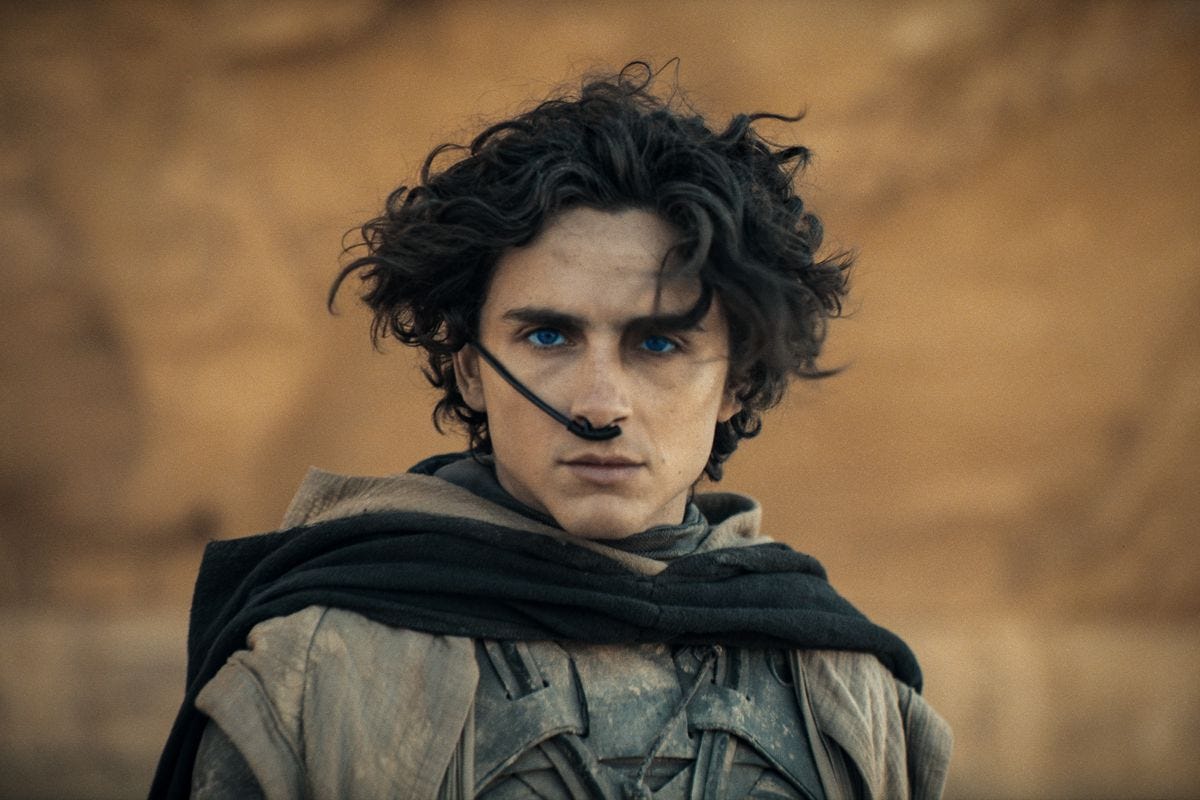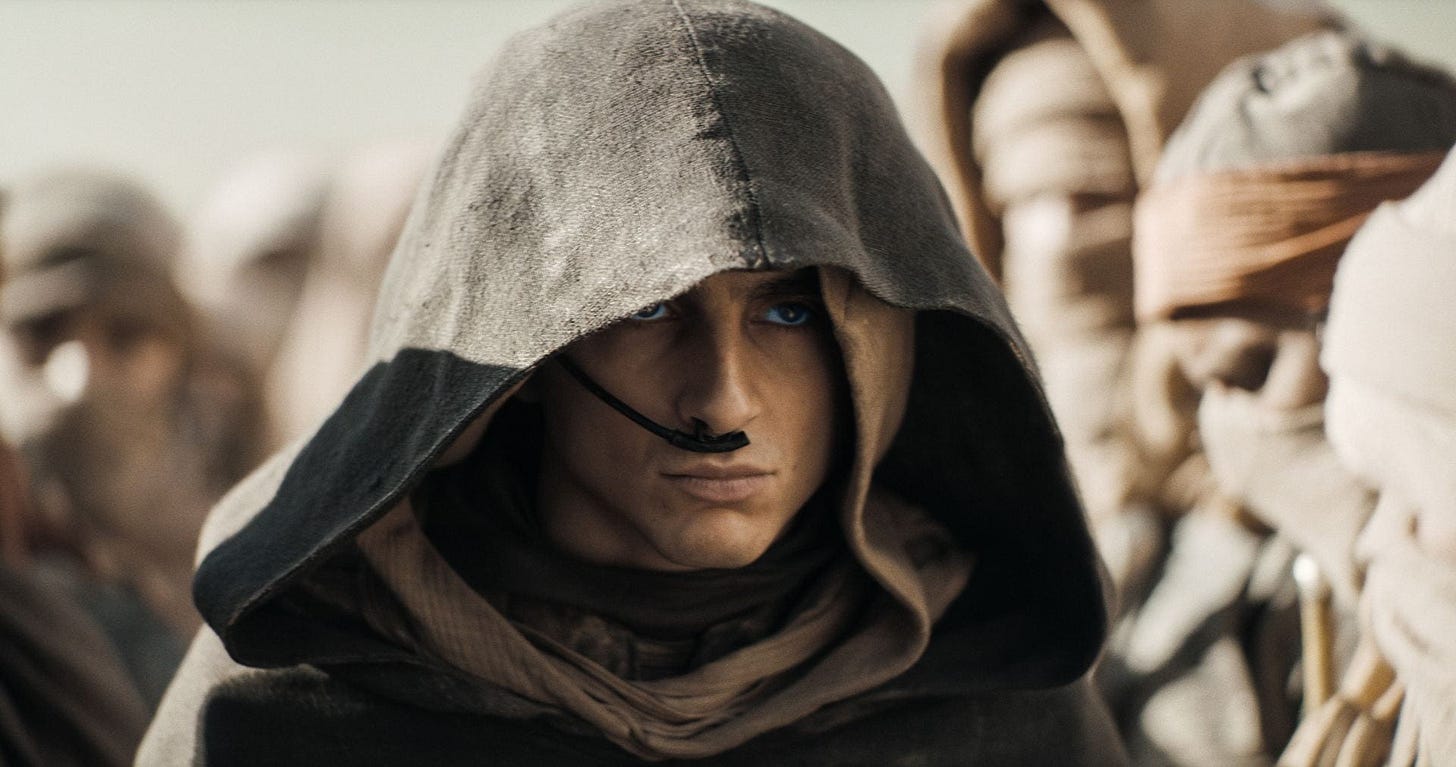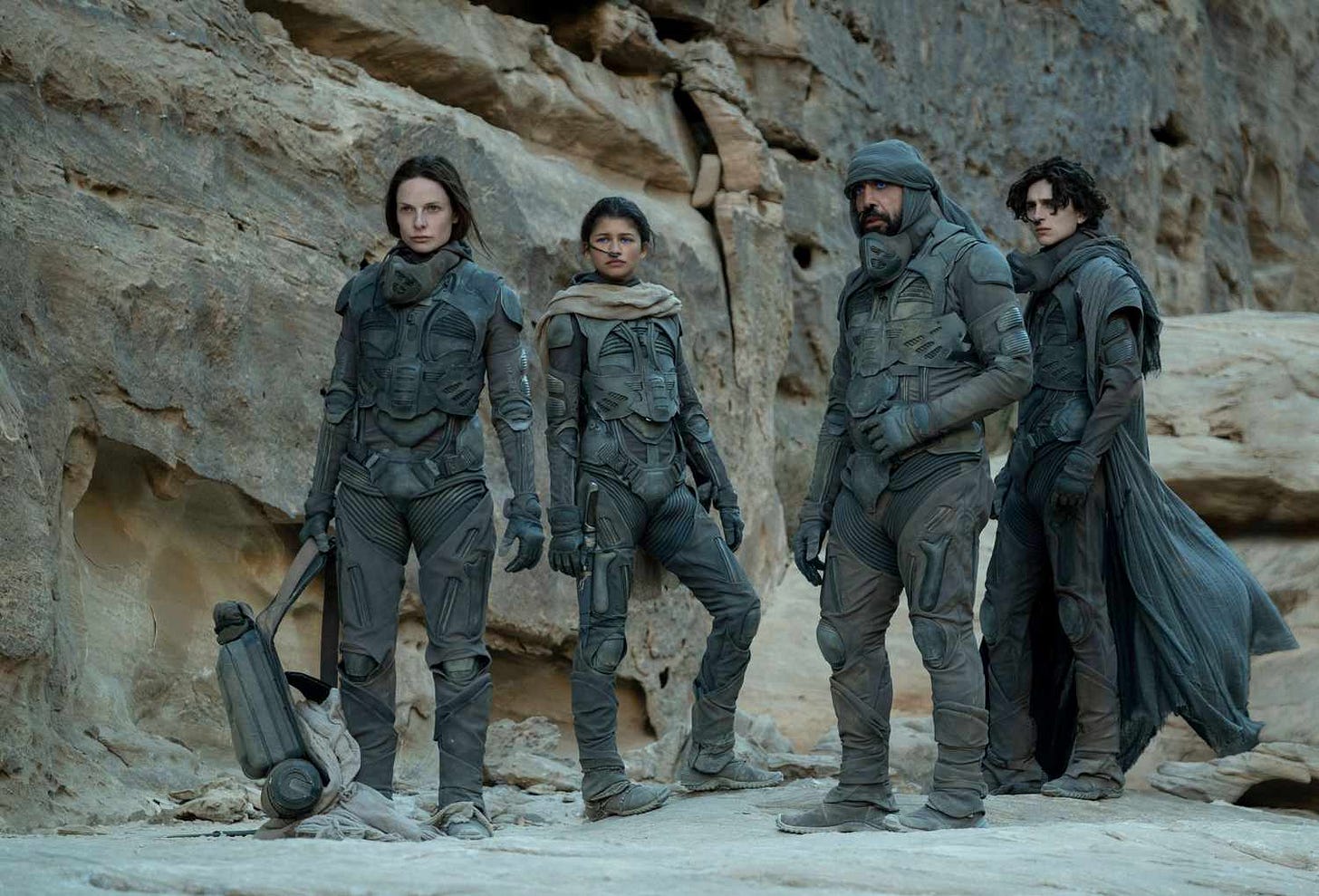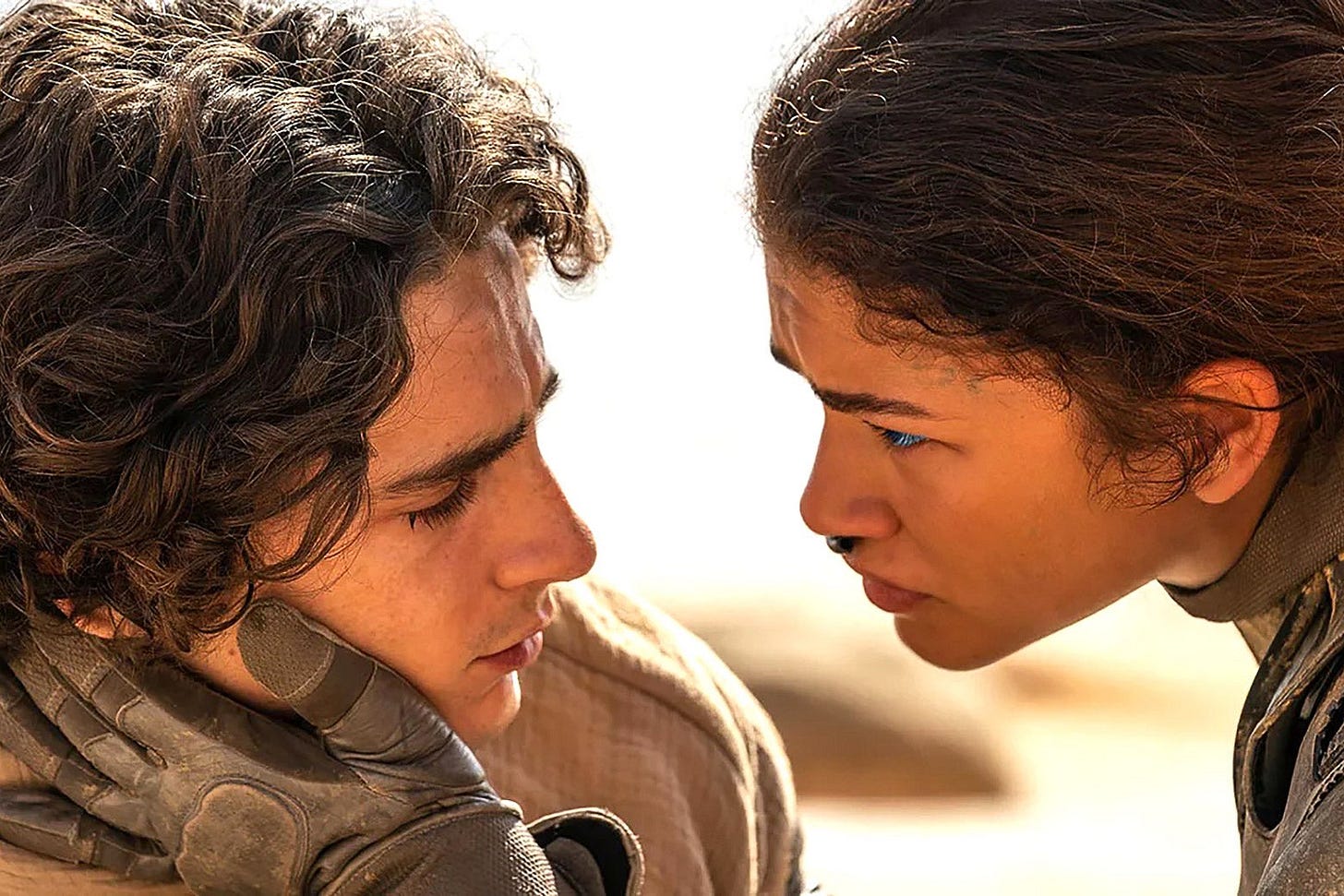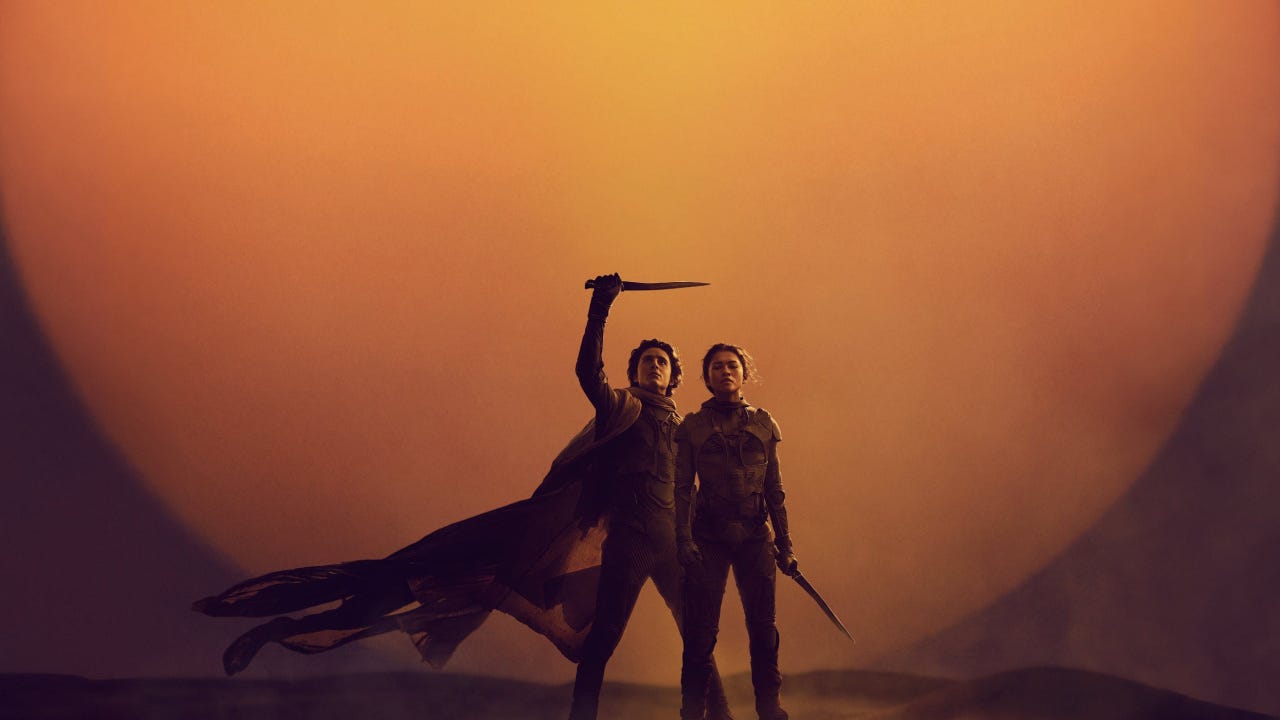Dune: Part Two rises above the rest
The long-anticipated sequel improves on the original in every way
Good filmmaking is good filmmaking - technological advancements are made and cultural tastes change, but on some level, quality stands the test of time. This is why The Lord of the Rings, two decades later, still shines as one of the best film trilogies of all time, if not THE best. This is why the original Star Wars has inspired over fifty years of prequels, sequels, spin-offs, books, comics, video games - you get the point. But despite the lasting legacy of such films, their initial impact should not be understated or overlooked; I was too young to see any of those Middle-earth classics in theaters, and the destruction of the Death Star precedes me by about twenty years, yet I always wondered what it must’ve been like to see these films in theaters for the first time. Yes, these films and those like them are unprecedented genre spectacles, but most critically, they gave audiences something that they had never quite seen before. Films such as these release infrequently, sometimes only once in a generation - for many people, that was Denis Villeneuve’s Dune, an ambitious science-fiction epic adapting the iconic and seminal novel of the same name. The second attempt at a big-screen adaptation, Villeneuve’s film only covers the first half of the novel and was released during the waning but still deadly months of the pandemic, yet critical reception was strong enough to encourage Warner Bros. (which would soon become a hollow shell of itself) to greenlight the much anticipated sequel. Unfortunately, I missed out on the initial run of that film, finally watching it on an outdated hotel television while traveling for work. But even in less-than-ideal conditions, I could appreciate the film’s scope, Villeneuve’s strong direction, and the source material’s rich and textured world. But then I saw Dune: Part Two, a follow-up better than its predecessor in almost every way. With a renewed commitment to a vision decades in the making, Villeneuve crafts a once-in-a-generation epic that must be seen to be believed - and you should do so on the biggest screen possible.
Dune: Part Two exists in a strange intersection of cause and effect, of inspiring and being inspired by. Frank Herbert’s 1965 novel, which I regretfully have yet to read, is not nearly as well-known or as popular as its influence would suggest (though these films will undoubtedly remedy that fact). Even from a cursory glance, Dune’s impact on George Lucas is obvious, with its desert planet, overbearing Imperial force, and a central hero who taps into a magical power. This isn’t to accuse Lucas of plagiarism or imitation, as Star Wars pulls from countless disparate inspirations and mixes them all together, producing something more than the sum of its parts. But if Star Wars is fantasy through a science-fiction lens, then Dune is science-fiction through a fantasy lens; whereas Lucas uses the trappings of space travel and aliens to explore deeper mythological truths, Herbert (and now Villeneuve) uses the trappings of magic and prophecy to explore philosophy, politics, and power. It’s interesting, then, to see how Villeneuve not only adapts the original novel but is also clearly inspired by the cinematic precedents that people like Lucas himself set with his own genre spectacles. In some ways, this cinematic duology is what Lucas’ prequel films of my childhood should have been: deeply philosophical and political films, doubling as technical showcases, that track the corruption of a hero and his tragic descent into dictatorship. Even the dialogue is, at least on paper, stilted at times, but unlike Lucas, Villeneuve gives his actors the room to breathe life into (potentially) mundane material. The film’s epic scope is always rooted in its characters, their goals, their flaws, and their destinies, giving clarity to an otherwise gargantuan endeavor.
It certainly helps just how well-realized the world of Dune is, but Villeneuve and co-writer Jon Spaihts obviously have Herbert to thank for such a detailed literary rendering of the world, its characters, and their politics. Like Star Wars and The Lord of the Rings, Dune: Part Two is a window into a fully-realized world that seems to exist independently of our own perception of it. Fantasy and science-fiction films, or really any stories with extensive world-building beyond our own, can sometimes feel forced, thin, and for our benefit only, but there’s a level of specificity here that is nearly unrivaled. You can pick anything in this film at random - a word, an article of clothing, an animal - and there’s probably enough lore and information about that thing to rival the length of this review. Of course, Villeneuve can’t include all of this information - disregarding the sheer volume of details, cinema is a visual medium, first and foremost. His aims have always been cinematic, loudly championing the theater experience as crucial for the medium’s survival. I’m off two minds on this issue, but Villeneuve makes a compelling argument here; his filmography has been hit or miss for me, never bad yet sometimes falling short of critical and popular hype, but his latest work is not only his best, but one of the best ever made. Big-budget sci-fi films have struggled at the box office (I’m looking at you, The Creator), but Villeneuve proves that there’s still a place for such stories. Seeing this film on IMAX 70mm, with its expanded aspect ratio and massive scale, is the perfect showcase for gorgeous cinematography by returning DP Greig Fraser. Filming in digital, then converting the footage to film stock, and then digitally scanning that film stock, a technique that he has used on the first film and The Batman, gives his work a textured warmth that further draws us in in ways that traditional digital filmmaking just can’t. A mix of practical and digital effects complement such choices and, coupled with the aforementioned world-building, makes you feel like you can step right onto the screen.
But we have yet to address the elephant in the room - this film is actually the second-half of one book, so shouldn’t the story feel incomplete? This division probably hurts the original film more, and though I’ve never read the book, Villeneuve’s first film’s narrative clearly has more room to grow feels like a complete experience. Its sequel is no different, and there’s enough shape to the story to feel as if it was always meant to be partitioned this way. Furthermore, at least in the way that Villeneuve has constructed his films, the decision to potentially continue this story as a trilogy feels organic, despite the fact that such a film would really be adapting the second novel written by Herbert just a few years after the original. This isn’t to say that there aren’t any narrative issues; in terms of actual plot points, this film is a bit on the lighter side, but there’s a strong enough emotional and thematic narrative at work to fully engage an audience. In any case, these two films make a wonderful pair, a sort of first and second act of one larger throughline. The pacing is neither fast nor slow, with Villeneuve methodically moving through beat after beat.
But often lost in films of this genre and scale are the characters, but the aforementioned focus on these narrative players helps the film stand out amongst its peers. I’m not sure how neatly segmented their appearances were in the original novel between the first and second halves, but a host of new characters are deftly introduced while naturally expanding on the old ones. Austin Butler’s transformation into the horrifying Feyd-Rautha Harkonnen is nothing short of mesmerizing; he completely and unrecognizably melts into the role of one of the fiercest characters ever put to screen, solidifying Butler’s undeniable talent. In opposite yet no less impressive ways is Florence Pugh as the Emperor’s daughter. Her subtle performance is what we’ve come to expect from her, but her grace and poise is crucial to the narrative and offers a much-needed respite from a story of action and struggle. Christopher Walken as the Emperor, on the other hand, is somewhat disappointing. To be sure, he’s not bad or even mediocre, but his casting feels inherently misguided - in any case, he’s barely in the film, so his impact on the film is minimal, despite his character’s presence being felt throughout this and the previous film. On the returning side, Zendaya finally gets more to do in a role that was largely relegated to objectified mysterious “goal” woman in the first film. She plays a crucial role in Paul’s arc, brought to vivid life by Timothée Chalamet. He’s always been a terrific actor (a professor of mine even called him the new James Dean), but I finally see what Villeneuve saw in him when he casted the young actor in a role that could have easily fallen flat. Chalamet commands such control and presence, despite his wiry build, that you truly believe that he could become a long-awaited messiah for a weary (and malleable) people. This is just a small sampling of a terrific ensemble cast that often says more when saying nothing at all. Such moments of silent introspection are underscored by an outstanding musical score - memes come and go, but that key vocal theme will surely outlive the TikToks to be considered an iconic melody in the annals of film history.
So what will Dune: Part Two’s overall place in those annals be? Denis Villeneuve’s original film, in retrospect, feels like a dress rehearsal - he was merely setting the table, and now it’s time for dinner. If you didn’t like the first film, I’m not sure how much you’ll like the second; it’s everything that the first film was, but better in every way. Villeneuve and DP Greig Fraser have put to screen one of the most visually striking movies of this century, easily giving David Lean’s Lawrence of Arabia a run for its money. Ultimately, the film does what every good film should do: keep us thinking. Dune: Part Two isn’t mindless blockbuster fare, but intellectually grounded and thematically rich. Its world and its characters contribute to a fantastic narrative yet are never swallowed by it as if sinking in sand. The novel was considered unfilmable, but Villeneuve has accomplished a feat greater than learning to ride a sandworm, giving us a glimpse into a world so three-dimensional that it nearly jumps off the screen. This must be what it was like to see the original Star Wars or Lord of the Rings in theaters - let’s just hope we don’t have to wait as long for another film to come along and give us that same feeling.


